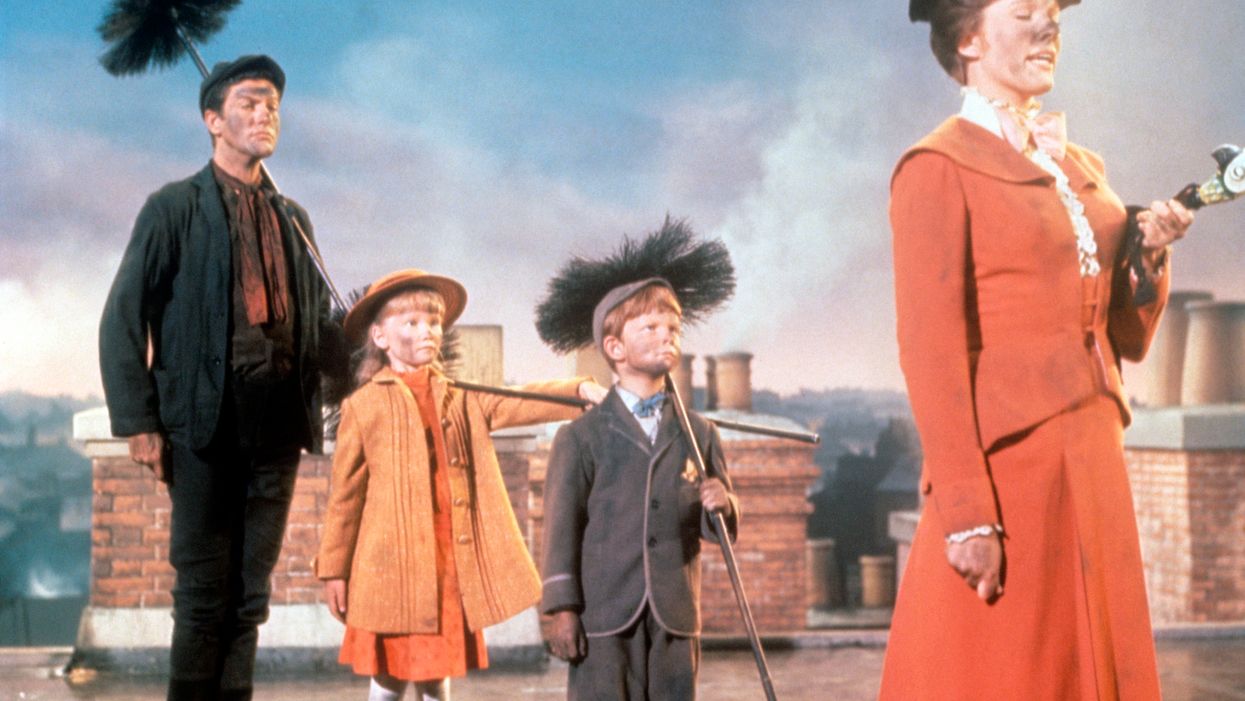
Mondadori Portfolio via Getty Images

A professor accuses the character of 'blacking up' in a scene from the classic 1964 children's film
A U.S. gender studies professor has labeled the classic children's film "Mary Poppins" as racist in a recent New York Times op-ed.
Daniel Pollack-Pelzner, a professor at Linfield College, pointed to a scene in the 1964 film where Mary Poppins' face is covered in black soot from a chimney.
"When the magical nanny (played by Julie Andrews) accompanies her young charges, Michael and Jane Banks, up their chimney, her face gets covered in soot, but instead of wiping it off, she gamely powders her nose and cheeks even blacker," Pollack-Pelzner wrote in the piece published Jan. 28.
He goes on to allege that the late P. L. Travers, who authored the series of children's books, was a racist.
"This might seem like an innocuous comic scene if Travers's novels didn't associate chimney sweeps' blackened faces with racial caricature. "Don't touch me, you black heathen," a housemaid screams in "Mary Poppins Opens the Door" (1943), as a sweep reaches out his darkened hand. When he tries to approach the cook, she threatens to quit: "If that Hottentot goes into the chimney, I shall go out the door," she says, using an archaic slur for black South Africans that recurs on page and screen.
"We're in on the joke, such as it is: These aren't really black Africans; they're grinning white dancers in blackface. It's a parody of black menace; it's even posted on a white nationalist website as evidence of the film's racial hierarchy," Pollack-Pelzner continued.
In "Mary Poppins Returns," which was released in December, Pollack-Pelzner criticized a scene where the nanny, played by Emily Blunt, "bounds onstage" at a music hall to sing a number with Lin-Manuel Miranda's lamplighter character.
They perform "A Cover Is Not The Book," which refers to Hyacinth McCaw, a wealthy widow from another one of Travers's novels.
" ... [A]nd the kicker is that she's naked: Blunt sings that "she only wore a smile," and Miranda chimes in, "plus two feathers and a leaf."
"In the 1981 revision of "Mary Poppins," there's no mention of her attire; you'd have to go back to the 1934 original to find the "negro lady" with "a very few clothes on," sitting under a palm tree with a "crown of feathers." There's even a straw hut behind Blunt and Miranda that replicates Mary Shepard's 1934 illustration. (The hut was removed in the 1981 revision.)"
The professor went on to say that minstrel history is "a mainstay of Disney musicals, including the jiving blackbird credited as Jim Crow in the 1941 "Dumbo" ("I be done seen 'bout ev'ything when I see an elephant fly")."
"The chief reason I wrote this article was the hope that a Disney exec would read it, take another look at the forthcoming Dumbo remake, and ask if there was anything just a little bit racist they might want to rethink before it hits the big screen," Pollack-Pelzner commented online after his column was published, according to the Evening Standard.
"Here's one thing I've learned about the alt-right, after I wrote this article and received a zillion hate messages in response: they sure like Mary Poppins!"